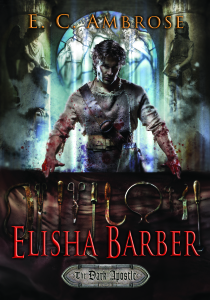What’s in a Name? The Naming of Elisha
It has come to my attention from two different and equally interesting directions that some people are wondering about the name of my protagonist, Elisha Barber, specifically, his first name. Some folks have even wondered if it’s my name (it’s not). The first to ask about his name is a very scholarly history buff follower of this blog who wondered how a peasant in 14th century England came to have this name, the second is the author of my first Goodreads review (four stars–thanks, Krystal!)
cover image for Elisha Barber, from DAW Books, cover by Cliff Nielsen
“Elisha” is a prophet from the old Testament, the originator of some interesting miracles and wonders which add some resonance to my book. It’s pronounced with a long “i” in the middle, not too different from “Elijah,” another Biblical prophet, and Elisha’s master. Are you confused yet? Thanks to Elijah Wood, the actor, most folks know how to pronounce that one.
A fun source for disambiguation (to borrow a term from Wikipedia) of the Elijah/Elisha confusion, if you ever have the chance, is the Reduced Shakespeare Company’s production of “The Bible: the Complete Word of God (abridged)” you can hear the song on their album of the show, but you won’t get to see the flashcards.
Of course, you can always check out Wikipedia for either of these guys: Elisha, or Elijah. (I am vastly amused that the Elisha entry is flagged for relying on a religious work without examining the commentaries, BTW.) I’d like to point out that my character, Elisha, is not a prophet, though he has certain unusual. . . talents. . .you will learn about in the book.
How did I choose his name? Biblical names have been popular in Europe for centuries, especially for boys, with a few always at the top of those annual Baby Name lists they come up with. The names trade places up there over the decades, but a name from the Bible is a pretty safe choice for a Christian of European descent. They are mostly New Testament figures (apostles are always popular) or big name kings from the Old Testament. If you check out , there, too, you’ll find the same names repeated over and over: John, William, Robert, Thomas, Richard, Hugh, Edward. And it’s here that the trouble starts. . .
I’m writing into history, relying on the milieu of the time, and sometimes on the people. And a very large number of those people are named William, Robert, Richard, Edward. . .so if I want to make the character my own, I need to choose something different, something unlikely, even, but believable. Looking down the rest of that list, I see a number of interesting names (Osbert, Wolfstan) but nothing that speaks to me about the nature of this character. It was to my own history I turned.
My father is a genealogy nut. He’s traced us back about as far as possible–yes, I’m related to Charlemagne (like a few million other people) and have a miniscule amount of African blood, thanks to a Roman consul who lived there. One of the families that fascinated me as a child hearing him speak about our history, were the Gores who came to America early on, and whose various children appear in battles here and there. What child of a certain bent could resist a name like “Gore”? And yes, one of those fascinating Gores was named “Elisha.” The name and surname, in my imagination at least, were tightly linked. What better name for a battlefield surgeon? From the moment I met Elisha, I knew his name.
While we’ve discussed and renamed some other key figures in the books, I am grateful, in spite of the potential confusion, that nobody ever suggested renaming Elisha. It was the name he was born with, from the fertile mind of that impressionable youth, when sowed with history, and sparked to write.





